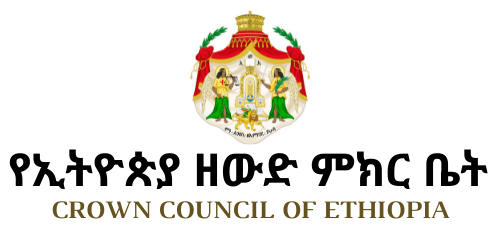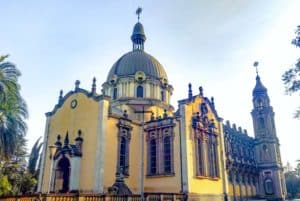His Imperial Highness Prince Ermias Sahle-Selassie Haile-Selassie, President of the Crown Council of Ethiopia, and his wife, HIH Princess Saba Kabede, visited Stockholm, Sweden, during March 2018. Prince Ermias was invested on March 24, 2018, by Princess Marianne Bernadotte with a Stockholm Cultural Award. Other Awards were presented to Gergey Boganyi (the Hungarian Concert Pianist), Rosemary Forbes Butler (the English opera singer), and Carola Haggkvist (the famous Swedish vocalist). The event took place at the House of Nobles.
Their Imperial Highnesses also had a private audience with Their Majesties King Carl XVI Gustaf of Sweden and Queen Silvia, recalling the friendship between the grandfathers of Prince Ermias and King Carl Gustaf, His Imperial Majesty Emperor Haile Selassie I and His Majesty King Gustaf VI Adolf.
While in Stockholm, Prince Ermias also addressed a Parliamentary group in the Riksdag. The full text of his address follows:
Let me express my great thanks to you, here in the Riksdag, for the opportunity to be with you today.
My pleasure in being with you today is compounded by the knowledge that my late Grandfather, His Imperial Majesty Emperor Haile Selassie I, enjoyed such strong relations with the Crown and People of Sweden.
His Imperial Majesty first came to Sweden in 1924, while he was still Negus — King — and before he was crowned as Emperor in 1930. Crown Prince Gustav Adolf paid a return visit to Ethiopia in 1935, the first visit by a Swedish member of the Royal Family to Africa.
And after World War II cleared away, the Emperor returned again to Sweden in 1954 and received a wonderful reception from His Majesty King Gustaf Adolf.
Today, after much cordial interchange between our peoples, we see Sweden as a wonderful host to many Ethiopians who fled the violence of the Dergue’s coup in 1974.
That Ethiopians have been so welcomed here in Sweden, and feel so much at home with their Swedish brethren, is very much due to the friendship begun by the Emperor and the King in 1954, and to the earlier contacts between our two countries.
Sweden’s contribution of important medical aid and facilities to Ethiopia, and its contributions to our agriculture and educational facilities, continues to this day to have a positive impact on the lives of Ethiopians;, and for that and all the other support for us by Sweden I add my profound thanks.
It is my hope that this visit will keep alive the great accord which has existed between the royal houses of our countries. But let me speak to several points which I believe are relevant:
- We live in a time of unique challenges, but they are still affected by the lessons of history. We see almost all nations divided by many factors, but mostly, because of modern transnational migration and urbanization, we see whole societies without a cohesive identity.
- The identity of nation-states — of the people who live within nation-states — cannot be defined by transitory politics, which often include competition over priorities for resources and attention. We are presently seeing nations throughout the world at war with themselves — far more than they are at war with other nations — over the absence or the erasure of the cohesive symbols of history. If we forget history, or if we fail to embrace the trans-generational character of our nation, then we are no longer a nation; no longer a unified society.
- The identity of a nation of peoples must be guided by symbols which have an enduring, historical nobility which transcend current politics and immediate materialism. The world has shown in measurable statistics that the most stable — and usually the most productive, happy, and prosperous — nation-states are the ones in which a non-political crown can represent the dignity and nobility of all the population, regardless of its diversity of political thought.
- We may not be able to end the philosophical polarization between urban and regional peoples — between urban globalists and regional nationalists — which presently divides so many societies. But we can ensure that each component of society has some over-arching identity which is reflected in unifying symbols and ideals of nobility and historical identity. If we politicize these symbols for short-term expediency then we risk destroying our last, best hope of preserving the nation-state.
- To this end, the Ethiopian Crown, which has been in the diaspora with so many Ethiopians since 1974, is increasingly playing a role in attempting to restore the sense of Ethiopianness to our country, to remind it of its three millennia of Solomonic history and its unique cultural values.
- The Dergue, in 1974, began a systematic program to erase all learning, and all books, about our great history. In so doing, they destroyed the momentum toward economic and social progress in Ethiopia, and took away its unique history and sense of nobility. The Dergue made us just another poor African country. But that is not our destiny.
- There have been interregna in Ethiopian history before, during our 3,000 years of the Solomonic line, and yet those interruptions and the destruction caused by them, have always been overcome, and Ethiopians have resumed their special identity and purpose. They will do so again.
- I need not remind you of the great and special history of Ethiopia since the time of the union between King Solomon and Queen Makeda of Saba, 3,000 years ago. But perhaps it is worth reminding you that there is no other unbroken bloodline in Western civilization, in Judeo-Christian culture, or even, should I say, in Abrahamic tradition, than the Solomonic bloodline. This is but one way in which the history of the Solomonic Crown is also a vital part of the history of the West, and even part of Sweden’s heritage.
- Ethiopia today is the principal geopolitical anchor of the Horn of Africa, and therefore of the Red Sea and Nile-dependent countries. It has a vital role to play as many aspects of its immediate region are at war or are in chaos. Resolution, therefore, of the current divisions within Ethiopia is of paramount importance to the world community and its prosperity.
- The Ethiopian Crown Council has offered itself as a mediating and unifying force in the present difficulties in Ethiopia. And to do this effectively, it must remain — and will remain — outside of and above politics. I need not tell you, here in the great Riksdag of Sweden, that governments come and go, and may reflect varying ideologies, but the Crown endures as a protective umbrella for all of those ideologies and governments, and for the people of the nation. So it must be again in Ethiopia.
- The Crown Council of Ethiopia also engages directly in charitable works, and we have spent much of our time in the development of unique new water purification technologies which are now becoming available to Ethiopians. These technologies, which require minimal maintenance and no filter changes, are designed to meet the difficult circumstances of Ethiopian, and African, remote conditions. Our Water Initiative for Africa is finally getting some traction.
- The Crown Council is also engaged in the beginnings of a process to restore historical knowledge and historical literacy to Ethiopians, in an attempt to regain what was destroyed by the coup of 1974. Again, let me say that a people deprived of its past is a people who will wander aimlessly into the future. My colleague and strategic philosopher Gregory Copley keeps reminding me that “if you don’t know where you’re going, then every road will lead to disaster”. Let me say to you that we do know where we must go, and we must ensure that all Ethiopians — and all the friends of Ethiopia — are once again embraced by a knowledge of our history, our great meaning to Western civilization, and our great mission to ensure, among other things, the freedom of navigation of the world’s trade through the Red Sea.
Distinguished members of the Riksdag, thank you for your time and attention today. I am happy to discuss any of these points and any other questions you may have. But before I close, let me say: God Bless His Majesty King Carl Gustaf XVI and the Swedish People.

The four awarded, from left to right; Gergey Boganyi (Hungarian Concert Pianist); Rosemary Forbes Butler(English Opera Singer); HIH Prince Ermias Sahle-Selassie Haile-Selassie (wearing the Order of Solomon and the Stockholm Cultural Award); Carola Haggkvist (Famous Swedish Vocalist) 
The House of Nobles where the ceremony was held 
Receiving the award from Princess Marianne Bernadotte (In the background Basha knyaz Rikard, Chairman of the Stockholm Culture Awards) 
Chatting with Lij (noble) Negussu Tamrat 
March 24 2018 Ball at the Stockholm Cultural Awards at the Nobility Palace, Stockholm: Second from left; Don Gunnar Andersson, Honorary Consul of Austria, Mr. Sverker and Paulina Littorin, Honorary Consul of Ethiopia, H.I.H. Archduchess Walburga, Princess Marianne Bernadotte, Lij Negussu Tamrat, Princess Saba, Prince Ermias








